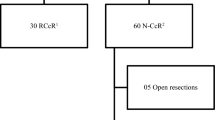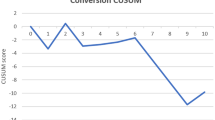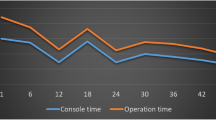Abstract
A background in minimally invasive colorectal surgery (MICS) has been thought to be essential prior to robotic-assisted colorectal surgery (RACS). Our aim was to determine whether MICS is essential prior to starting RACS training based on results from our initial experience with RACS. Two surgeons from our centre received robotic training through the European Academy of Robotic Colorectal Surgery (EARCS). One surgeon had no prior formal MICS training. We reviewed the first 30 consecutive robotic colorectal procedures from a prospectively maintained database between November 2014 and January 2016 at our institution. Fourteen patients were male. Median age was 64.5 years (range 36–82) and BMI was 27.5 (range 20–32.5). Twelve procedures (40%) were performed by the non-MICS-trained surgeon: ten high anterior resections (one conversion), one low anterior resection and one abdomino-perineal resection of rectum (APER). The MICS-trained surgeon performed nine high and four low anterior resections, one APER and in addition three right hemicolectomies and one abdominal suture rectopexy. There were no intra-operative complications and two patients required re-operation. Median post-operative stay was five days (range 1–26). There were two 30-day re-admissions. All oncological resections had clear margins and median node harvest was 18 (range 9–39). Our case series demonstrates that a background in MICS is not essential prior to starting RACS training. Not having prior MICS training should not discourage surgeons from considering applying for a robotic training programme. Safe and successful robotic colorectal services can be established after completing a formal structured robotic training programme.
Similar content being viewed by others
References
Jacobs M, Verdeja JC, Goldstein HS (1991) Minimally invasive colon resection (laparoscopic colectomy). Surg Laparosc Endosc 1:144–150
Barnajian M, Pettet D, Kazi E, Foppa C, Bergamaschi R (2014) Quality of total mesorectal excision and depth of circumferential resection margin in rectal cancer: a matched comparison of the first 20 robotic cases. Colorectal Dis 16:603–609
Essani R, Bergamaschi R (2016) Robotic colorectal surgery: advance or expense? Adv Surg 50:157–171
AlAsari S, Min BS (2012) Robotic colorectal surgery: a systematic review. ISRN Surg 2012:293894
Liao G, Zhao Z, Lin S et al (2014) Robotic-assisted versus laparoscopic colorectal surgery: a meta-analysis of four randomized controlled trials. World Surg Oncol 12:122
Gorgun E, Ozben V, Costedio M, Stocchi L, Kalady M, Remzi F (2016) Robotic versus conventional laparoscopic rectal cancer surgery in obese patients. Colorectal Dis 18:1063–1071
Ahmed J, Nasir M, Flashman K, Khan J, Parvaiz A (2016) Totally robotic rectal resection: an experience of the first 100 consecutive cases. Int J Colorectal Dis 31:869–876
Sawada H, Egi H, Hattori M et al (2015) Initial experiences of robotic versus conventional laparoscopic surgery for colorectal cancer, focusing on short-term outcomes: a matched case-control study. World J Surg Oncol 13:103
Stãnciulea O, Eftimie M, David L, Tomulescu V, Vasilescu C, Popescu I (2013) Robotic surgery for rectal cancer: a single center experience of 100 consecutive cases. Chirurgia 108:143–151
Jiménez-Rodríguez RM, Díaz-Pavón JM, de Juan FDLP, Prendes-Sillero E, Dussort HC, Padillo J (2013) Learning curve for robotic-assisted laparoscopic rectal cancer surgery. Int J Colorectal Dis 28:815–821
Bokhari M, Patel C, Ramos-Valadez D, Ragupathi M, Hass E (2011) Learning curve for robotic-assisted laparoscopic colorectal surgery. Surg Endosc 25:855–860
Oviedo R, Robertson J, Alrajhi S (2016) First 101 robotic general surgery cases in a community hospital. JSLS 20(e2016):00056
Tou S, Bergamaschi R, Heald RJ, Parvaiz A (2015) Structured training in robotic colorectal surgery. Colorectal Dis 17:185
Brinkman W, de Angst I, Schreuder H et al (2017) Current training on the basics of robotic surgery in the Netherlands: time for a multidisciplinary approach? Surg Endosc 31:281–287
Spinoglio G, Choi GS, Parvaiz A et al (2016) Structured training and competence assessment in colorectal robotic surgery. Results of a consensus experts round table. Int J Med Robot 12:634–641
Bell S, Carne P, Chin M, Farmer C (2015) Establishing a robotic colorectal surgery programme. ANZ J Surg 85:214–216
The European Academy of Robotic Colorectal Surgery (EARCS) (2014). https://earcs.pt/. Accessed 9 Nov 2016
Zawadzki M, Rząca M, Czarnecki R et al (2014) Beginning robotic assisted colorectal surgery—it’s harder than it looks! Wideochir Inne Tech Maloinwazyjne 9:562–568
Collinson FJ, Jayne DG, Pigazzi A et al (2012) An international, multicentre, prospective, randomised, controlled, unblinded, parallel-group trial of robotic-assisted versus standard laparoscopic surgery for the curative treatment of rectal cancer. Int J Colorectal Dis 27:233–241
Author information
Authors and Affiliations
Contributions
Ideas: TS, GT, HP, JL, WS, NH, HA, KS, ST. Data analyses: TS, HP. Drafting the manuscript: TS, GT, JL, ST. Final approval of manuscript: TS, GT, HP, JL, WS, NH, HA, KS, ST.
Corresponding author
Ethics declarations
Conflict of interest
Mr. T. Sian, Miss. G. Tierney, Miss. H. Park, Mr. J. Lund, Mr. W. Speake, Mr. N. Hurst, Mr. H. Al Chalabi, Miss. K. Smith and Mr. S. Tou declare that they have no conflict of interest.
Informed consent
All procedures performed were in accordance with the ethical standards of the responsible committee on human experimentation (institutional and/or national) and with the Helsinki Declaration of 1975 as revised in 2000. For this type of study formal consent is not required.
Rights and permissions
About this article
Cite this article
Sian, T.S., Tierney, G.M., Park, H. et al. Robotic colorectal surgery: previous laparoscopic colorectal experience is not essential. J Robotic Surg 12, 271–275 (2018). https://doi.org/10.1007/s11701-017-0728-7
Received:
Accepted:
Published:
Issue Date:
DOI: https://doi.org/10.1007/s11701-017-0728-7




